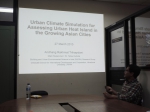Unlocking Economic Potential: SAPPK Course Shines in 2023 Winter School's Spotlight on Small Island Development
By Anggun Nindita
Editor Anggun Nindita

BANDUNG, itb.ac.id – ITB's School of Architecture, Planning and Policy Development (SAPPD) held an international virtual course online, on 15-16 September 2023. This activity was part of the Winter School program in collaboration with Universiti Sains Malaysia and Politeknik Pariwisata Lombok.
The main theme discussed in this course was “Small Island Planning", which is relevant to Indonesia since it has many small islands and strategic coastal cities.
One of the SAPPK ITB lecturers, Adiwan Fahlan Aritenang, S.T., M.GIT., Ph.D., was one of the speakers in this course. He discussed several important issues related to small island planning, including the strategic position of coastal cities in the global economic system. He declared that coastal cities had long been the center of Indonesian civilization. The kingdoms of Samudra Pasai, Lingga, and Sriwijaya are some proof of the thriving coastal cities. They are important points in international trade just like Rotterdam.
He also expressed the great potential in national waters, both in terms of natural resource wealth and environmental services. However, there are a number of challenges that need more attention such as environmental problems, weak regulations, and the minimal role of the community in decision making regarding coastal area management.

In the context of economic development, there are several potential coastal and small island resources, including renewable resources such as fisheries, mangrove forests, as well as non-renewable resources like oil and gas. Apart from that, there is also potential for marine energy and environmental services such as settlements, tourism and preservation of cultural buildings. Some examples of coastal cities that have become centers of economic growth include Labuan (Malaysia), Subic (Philippines), and Canary Wharf (England).
In order to create ideal economic development, he emphasized the importance of developing physical and non-physical infrastructures, among them being clear regulations, labor regulations and good spatial planning.
He pointed out that in the context of Indonesia, which possesses the world's longest coastline, the development of coastal cities holds substantial potential. This potential extends to them becoming focal points for investment and elevating urban competitiveness.
This lecture material provided an in-depth view of small island planning and the role of coastal cities in economic growth, as well as the challenges and opportunities Indonesia faces in developing its coastal areas. With a better understanding of these issues, it is hoped that more effective steps can be taken to advance coastal cities and small island regions in the future.
Reporter: Hafsah Restu Nurul Annafi (Urban and Regional Planning, 2019)
Translator: Ayesha Lativa Mafaza (Postharvest Technology ‘21)
Editor: Hanna Daniela Ayu (Aerospace Engineering, 2021)

.jpg)
.jpg)
.jpg)
.jpg)
.jpg)

.jpg)
